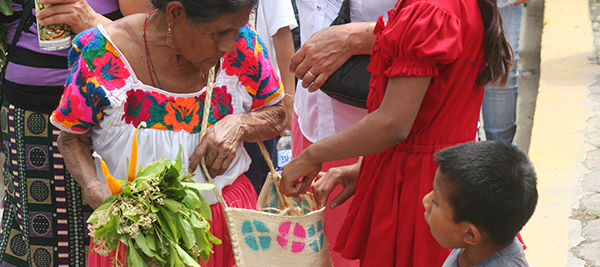5 Tips for Talking About Border Communities
When drafting responses to the President’s announcement today, please keep in mind the particular needs of border communities, whose voices are often ignored and rights trampled in attempts to “secure the border.” You can help your border allies by considering the following five tips. This advice was developed with input from the ACLU of New Mexico, Alliance San Diego, American Friends Service Committee US/Mexico Border Program, Border Network for Human Rights, Colibri Center for Human Rights, and the Southern Border Communities Coalition.
Core Message: President Obama’s announcement provides much-needed relief to millions of people and is a real victory for the country. However, there are still concerns. For one thing, today’s announcement continues and reinforces some misguided policies that affect communities in the border region. The border region is economically vibrant and culturally diverse. It’s home to millions of people, from San Diego to Brownsville, who want to be able to enjoy life in their communities the same as any of us.

1. Humanize the discussion. Consider terms like “border communities,” “border region,” and “borderlands.”
The border is more than a line, and referring simply to “the border” suggests we’re only talking about a fence and how to protect it.
- Focus on the people, culture, and history of border communities and stress that those communities suffer when misguided policies cause human rights abuses and drain resources better spent on more productive uses.
- Naming specific communities – San Diego, El Paso, Tucson – can help people visualize the communities affected by irresponsible border policies and can help to counter the people-less desert scenery sometimes conjured up by “border.”
- Sample language: The border region is economically vibrant and culturally diverse – home to millions of people from San Diego to Brownsville. Families whose roots here go back centuries share the region with newcomers from around the country and around the world. It’s an economic cornerstone and international trade hub, and 1 in 24 jobs across the country depend on it.
- Sample language: Millions of people live in the border region or many people know someone who does. Border communities have much to offer the nation economically and culturally, but these contributions have been stunted or overshadowed by an irresponsible build up of border enforcement
2. Stress that communities need to have a say in decisions that affect them.
Border communities’ voices have been drowned out or ignored in political debates around immigration. Underscore that any policy must be responsive to the expressed needs of border residents.
- Sample language: We live in a democracy, and Americans strongly believe that we should all have a say in decisions that affect us. But when it comes to policies that affect the border region, policy makers often ignore community voices and needs. For example, over protests from the community, the border has grown increasingly more militarized as we dump money into drones, checkpoints, and guns. Instead, let’s look at policies that bolster trade at the border and invest in critical infrastructure projects.
- Sample language: Border communities want safe, efficient, and effective border policies that respect the culture and community of the borderlands.
3. Talk about how current border policies and spending result in violations of our values.
We are a country that believes in community, fairness, and human rights. But misguided policies that allocate spending towards drones, weapons and family detention facilities do not uphold these values.
- In describing the all-too-frequent tragedies that occur, balance those stories with specific policy solutions that will help to prevent them.
- Stress that Border Patrol must be held accountable. We need policies that ensure oversight, training and equipment like body-worn cameras that will help ensure the protection of human rights.
- Sample language: For decades, failed border enforcement policies have exacerbated migrant deaths, destabilized local economies, and debilitate protections to civil liberties.
- Sample Language: Instead of pouring more money into unnecessary and excessive drones and police forces, we need investments in the ports-of-entry and infrastructure. Instead of giving border patrol free reign and tacitly accepting human rights violations, we need hold agents accountable and charge them with protecting human rights.
4. Repeating myths isn’t helpful, even when attempting to discredit them.
There have been many outrageous and false stories about the border in the media, many promoted by members of Congress and others in power. It’s important to promote truthful stories about border communities instead of providing further publicity to false reports about terrorists, drug cartels and the like.
5. Don’t rely on “border security” as an attempt to bridge partisan divides.
Suggesting that helping 11 million people should come at the expense of border communities in an attempt to garner more conservative support is not helpful to the movement, and actively harmful to the millions of people who live in border communities. We can advocate for a pathway to citizenship without reinforcing the myth that the border is not secure.



